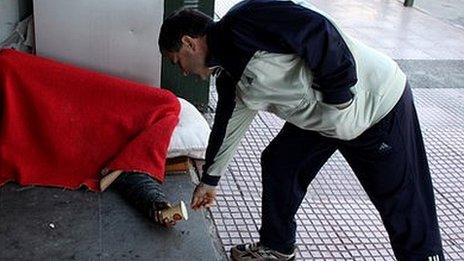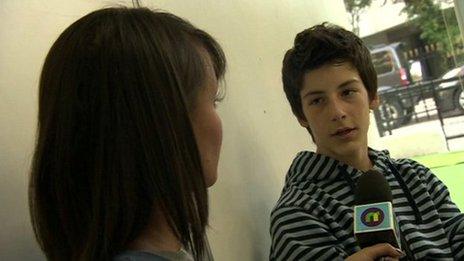What's going on with Greece and its economy?
- Published
Ricky finds out what life is like in the Greek capital, Athens
Greece has agreed a deal to try and tackle the huge money problems in the country.
It owes billions of pounds to banks and other countries in Europe but some of these countries have agreed to help Greece out.
In exchange the Greek government will have to do lots of things to try and reduce what they owe, like increasing the amount of money they take off Greek people in tax and reducing how much older people get for their pension.
It's the third time the European Union has given Greece what's known as a bailout.
An EU statement on Monday said they would give Greece 86 billion Euro over the next three years.
The deal came after long talks through the night and after weeks of uncertainty. Here's a recap of what's been happening.
Greek people have their say
In a big vote on Sunday 5 July, the Greek people decided to say no to a deal with countries who they owe money to.
Over the last 10 years, Greece borrowed lots of money from European banks and from other countries' governments.
It used the money to run the country, pay for the 2004 Olympic Games and also for things like big pay rises for people who are paid by the government.
But they've found it hard to pay it back because when you borrow money, you have to pay what's called 'interest': meaning you pay back more money than you borrowed to begin with.
12-year-old friends Zoe and Christina, who live in Athens, tell Ricky how the money crisis has hit them
Many Greeks felt it was unfair to keep paying back the money in the way that they have been doing, because it makes life very hard for ordinary people.
But how have things got this bad?
Banks shut
Banks in Greece have been closed for more than a week and people who live there limited to getting no more than 60 Euro from cash machines.
That happened after the European Central Bank, which has been giving Greece money, decided not to give them any more.
They did this because Greece couldn't reach an agreement with them.
Why have Greece's banks closed for a week?
Greece then decided to shut the banks and restrict the amount of cash machines that work, because they don't have the money they need.
There are big queues as worried people in Greece attempt to take out their money.
How much money does Greece owe?
Ricky finds out how Greek kids' lives have been affected by the money problems
Their total debt is 323 billion Euros, which they owe to various countries and banks within Europe.
Greece is due to pay back 1.6 billion Euros on Tuesday and people are now watching closely to see if they repay this or not.
2008 Crisis
Why is Greece in so much trouble?
In 2008, the whole world was hit by a banking crisis where all the world's banks were worried they wouldn't get their money back.
The cost of borrowing money from banks went up hugely - and Greece had borrowed and spent so much that it couldn't afford to repay its debts.
Greece isn't alone though - all countries borrow money, and Portugal, Spain, Italy and Ireland are all very badly in debt, too.
Why are other countries so worried?
Ricky finds out how one Greek family have changed the way they live to save money
If Greece were to completely run out of money, it would cause huge problems for all the countries and banks in Europe, because they would lose all the money they lent to Greece.
Britain's affected too, even though it doesn't use the Euro.
Because European countries buy so much of our stuff, what happens to those countries would affect Britain too.
Tough money rules for Greece
The government has spent less on schools and hospitals
Almost everything has become more expensive to buy, from petrol to food
The public has paid more tax on what they've earned
People paid by the government were given less, and thousands lost their jobs
In 2011, other countries in Europe, led by France and Germany, clubbed together to try to help Greece out.
They decided to lend it more money - hundreds of billions of Euros - but things are so bad that even that amount wasn't enough.
Europe's leaders decided that the banks that had lent money to Greece should agree to cut the amount the country owed them by half - and that European governments would give Greece even more money.
But all of this came with strict conditions - that Greece must stop spending so much money.
Many people in Greece weren't happy with the conditions and there were lots of protests on the streets against the government's plans to raise taxes and cut spending.
- Published21 February 2012

- Published10 November 2011

